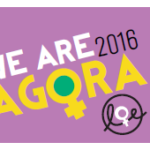Abstract/excerpt: The following text concerns the issue of purity culture and virginity myth. It touches the subject of fear-based sex education and its harmful impact on young people, especially the ones with female reproductive organs.
Keywords: virginity, purity culture, sex education
In the light of the twenty-first century, we still seem to live in a culture where we celebrate virginity by fearing its loss unless it takes place under strictly specified conditions. The concept of purity, entirely based on shame, guilt and misinformation (including absolute disregard of the human anatomy) is placed upon young people – especially the ones that happen to be born with vaginas, since they’re the main target of patriarchal oppression.
As the majority of women, I have been subjected to the virginity obsession throughout my whole adolescence. Besides well known religious dogmas, such as the importance of staying pure (implying that sex inherently makes one dirty, which magically changes after marriage and suddenly becomes sacred and wonderful), I was told on multiple occasions that one of the biggest treasures I own as a woman is my hymen. Growing up, I started to feel extremely uncomfortable with the idea that my value revolves around a physical feature that I had no idea about due to the lack of any sex education in my environment. I believed that the hymen was some scary, mysterious thing hanging out inside my vagina and waiting to be painfully torn apart by, obviously, a penis. Waiting until marriage was supposed to guarantee success, love and mutual respect between me and my husband (the possibility of being in a relationship with a woman was obviously unacceptable).
“Slut-shaming and spreading false information is at the core of this practice, perpetuating the idea that not having sex makes one better and more worthy of love and success.”
There is, therefore, no surprise that, as a result, young women are often terrified of their first intercourse, especially if it concerns heterosexual relationships. It takes around 10 seconds to look up any “first-time” related questions asked by women online and understand the scale of the problem. While it is obviously normal and natural to experience some level of anxiety when it comes to sexual initiation, the presence of virginity myth and purity culture is responsible for creating a toxic narrative that has very little, if nothing to do with reality. In this matter, women are considerably more vulnerable than men. I remember each time a girl in my high school friends group had sex for the first time, the first question we would always ask was “did it hurt?” – something no man has probably ever worried about.
Purity culture divides women between two opposites: dirty, sinful and unworthy versus pure, intact and beautiful. Virgins are fetishized and the concept of marrying (or rather: possessing) one is presented as a precious gift for any man walking this planet. Slut-shaming and spreading false information is at the core of this practice, perpetuating the idea that not having sex makes one better and more worthy of love and success. I remember a woman referring to her first time (despite describing it as consensual and romantic) as a moment when she “lost her power” – I find it a perfect example of how harmful the virginity myth is.
“If we don’t make a group effort to change our views on this subject, young people will remain prone to manipulation, fear-based sex education and abuse.”
I feel extremely uneasy and uncomfortable seeing parents, teachers and other authority figures encouraging and supporting this toxic narrative. Young, often even pre-pubescent girls are taught that their value doesn’t come from simply being a human being – it comes directly from their vagina. It’s actually quite ironic since purity culture preachers believe they are fighting the sexualization of teenagers, while simultaneously doing so themselves.
As an example, I would like to show some paragraphs from a textbook that is soon going to be introduced in Polish primary schools – translated into English, it’s entitled “Sex according to John Paul II will set you free” and it’s based solely on Catholic principles. While I believe in religious freedom and fully support it, this book is full of extremely harmful, misogynistic and false information. One of the passages, for example, compares the human body to an iPhone, saying that once you give your phone to someone else, you no longer own it – translated directly it means “If I give something to someone, it’s no longer mine. I cannot give my body for the second, fifth or hundredth time! It’s not possible. Simple? Simple!” – Following this path of thinking, if I ask you to hold my bag it’s yours from now on, and if we shake hands, well, they’re all yours as well. You’re welcome.
On another page, we find a bright red-colored sentence, written in big lettering and saying “Each female body fits each male body!!!” It seems like the message here is pretty obvious – experiencing physical difficulties during intercourse or simply not being interested in the opposite sex? Not valid, get over yourself and do it anyway – after a heterosexual marriage ceremony, of course.
There are many more aspects of the virginity myth that I’m not able to fit in here. I would like to sum it up with a warning – if we don’t make a group effort to change our views on this subject, young people will remain prone to manipulation, fear-based sex education and abuse. Nevertheless, I’m glad we are slowly opening ourselves to conversation and questioning standards imposed by patriarchy throughout the centuries.





![Abortion rights in Croatia: Why we must fight for their preservation – Pravo na pobačaj: Ili kako se uvijek iznova moramo boriti za njegovo očuvanje [EN/HR]](https://www.youngfeminist.eu/wp-content/uploads/2015/12/6b5fe40299f6eace25557328eb178533-150x150.png)
Average Rating